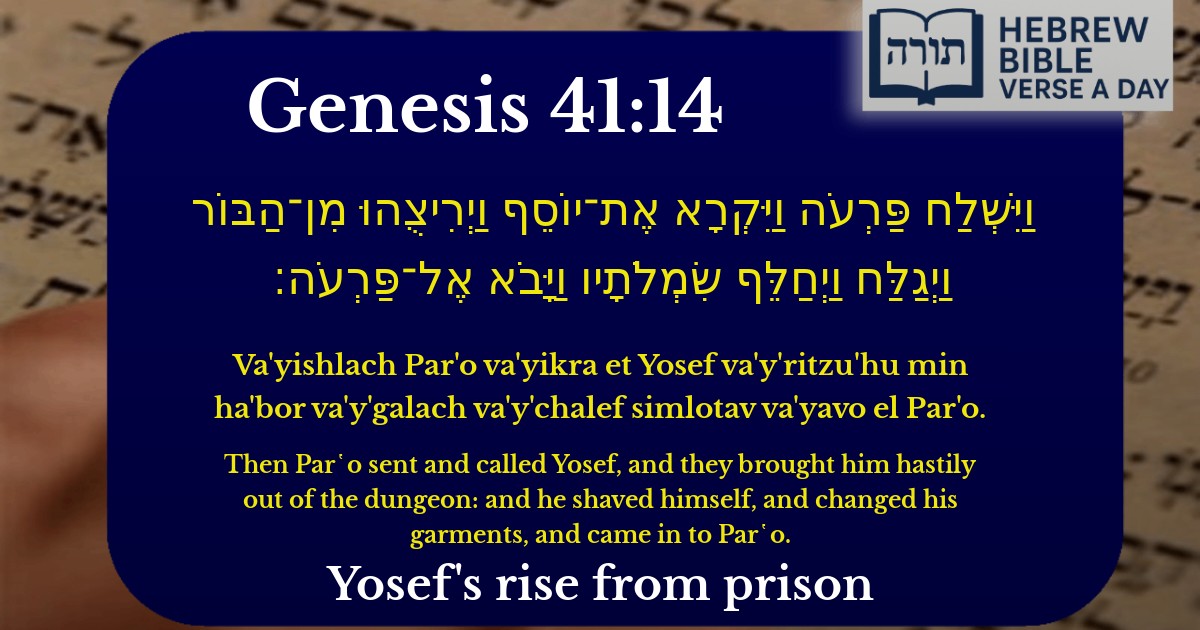Join Our Newsletter To Be Informed When New Videos Are Posted
Join the thousands of fellow Studends who rely on our videos to learn how to read the bible in Hebrew for free!
Hebrew Text
וַיִּשְׁלַח פַּרְעֹה וַיִּקְרָא אֶת־יוֹסֵף וַיְרִיצֻהוּ מִן־הַבּוֹר וַיְגַלַּח וַיְחַלֵּף שִׂמְלֹתָיו וַיָּבֹא אֶל־פַּרְעֹה׃
English Translation
Then Par῾o sent and called Yosef, and they brought him hastily out of the dungeon: and he shaved himself, and changed his garments, and came in to Par῾o.
Transliteration
Va'yishlach Par'o va'yikra et Yosef va'y'ritzu'hu min ha'bor va'y'galach va'y'chalef simlotav va'yavo el Par'o.
Hebrew Leining Text
וַיִּשְׁלַ֤ח פַּרְעֹה֙ וַיִּקְרָ֣א אֶת־יוֹסֵ֔ף וַיְרִיצֻ֖הוּ מִן־הַבּ֑וֹר וַיְגַלַּח֙ וַיְחַלֵּ֣ף שִׂמְלֹתָ֔יו וַיָּבֹ֖א אֶל־פַּרְעֹֽה׃
וַיִּשְׁלַ֤ח פַּרְעֹה֙ וַיִּקְרָ֣א אֶת־יוֹסֵ֔ף וַיְרִיצֻ֖הוּ מִן־הַבּ֑וֹר וַיְגַלַּח֙ וַיְחַלֵּ֣ף שִׂמְלֹתָ֔יו וַיָּבֹ֖א אֶל־פַּרְעֹֽה׃
🎵 Listen to leining
Parasha Commentary
📚 Talmud Citations
This verse is quoted in the Talmud.
📖 Sotah 36b
The verse is referenced in the context of discussing Joseph's rise from the dungeon to stand before Pharaoh, highlighting his transformation and readiness for leadership.
📖 Berakhot 55a
The verse is mentioned in a discussion about dreams and their interpretations, relating to Joseph's interpretation of Pharaoh's dreams.


Pharaoh's Summons and Yosef's Preparation
The verse describes Pharaoh summoning Yosef from the dungeon and Yosef's immediate preparations before appearing before the king. The sequence of events holds deeper significance according to traditional Jewish commentaries.
Rashi's Explanation of "וַיְרִיצֻהוּ" (They Brought Him Hastily)
Rashi (Bereshit 41:14) notes that the term וַיְרִיצֻהוּ ("they brought him hastily") implies urgency. This suggests that Pharaoh's need for Yosef's interpretation was pressing, emphasizing Divine Providence—Yosef's release was timed precisely when his wisdom was required.
The Significance of Shaving and Changing Garments
The verse states that Yosef shaved (וַיְגַלַּח) and changed his clothes (וַיְחַלֵּף שִׂמְלֹתָיו) before meeting Pharaoh. Several commentaries elaborate on this:
Spiritual Lessons from Yosef's Actions
The Sforno (Bereshit 41:14) highlights that Yosef's meticulous preparation—despite his sudden release—teaches the importance of presenting oneself properly when serving in a position of influence. His actions reflect the balance between maintaining Jewish identity and engaging respectfully with foreign leadership.